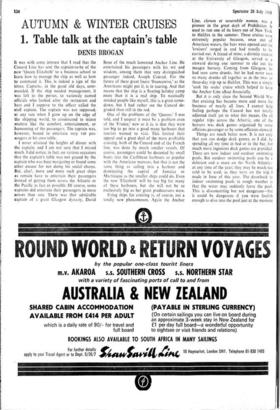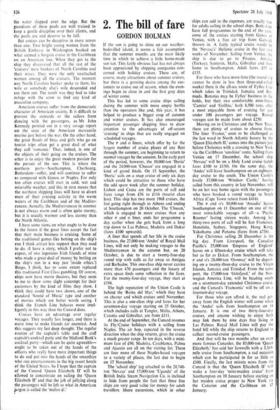1. Table talk at the captain's table AUTUMN & WINTER
CRUISES
DENIS BROGAN
It was with some interest that I read that the Cunard Line has sent the captain-to-be of the new 'Queen Elizabeth' to a business school to learn how to manage the ship as well as how to command it. This is indeed a sign of the times. Captains, in the good old days, com- manded. If the ship needed management, it was left to the purser, to variously name4 officials who looked after the restaurant and bars and I suppose to the officer called the staff captain. The captain was not supposed, at any rate when I grew up on the edge of the shipping world, to condescend to minor matters like the comfort, entertainment, or humouring of the passengers. The captain was, however, bound to entertain very VIP pas- sengers at his own table.
I never attained the heights of dinner with the captain, and I am not sure that I missed much. I did notice, in fact, on various occasions that the captain's table was not graced by the captain who was busy navigating or found some other excuse for not doing his social chores. But, alas!, more and more such great ships as remain have to entertain their passengers instead of getting them across the Atlantic or the Pacific as fast as possible. Of course, some captains did entertain their passengers in more senses than one. There was that admirable captain of a great Glasgow dynasty, David Bone of the much lamented Anchor Line. He entertained his passengers with his wit and wisdom, among them that very distinguished passenger indeed, Joseph Conrad. For the future of these great liners 'financewise,' as the Americans might put it, is in touring. And that means that the ship is a floating holiday camp more than it is a real ship. To nautically minded people like myself, this is a great come- down, but I had rather see the Cunard de- graded than still in the red.
One of the problems of the 'Queens,' I was told, and I suspect it must be a problem even of the 'France,' new as it is, is that they were too big to go into a good many harbours that tourists wanted to visit. This limited their appeal and a great deal of the more profitable cruising, both of the Cunard and of the French line, was done by much smaller vessels. Of course, passengers could be decanted by small boats into the Caribbean harbours so popular with the American matrons, but that is not the same thing as sailing into a harbour and dominating the capital of Jamaica or Martinique as the smaller ships could do. Even the new 'Elizabeth' will be too big for many of these harbours, but she will not be so exclusively big as her great predecessors were.
Using ships for cruising is, of course, not a totally new phenomenon. Again the Anchor
Line, clarum a venerabik nomen, was a pioneer in the great dayt of Prohibition. It used to run one of its liners out of New York to Halifax in the summer. These cruises v,ere extremely popular because, once out of American waters, the bars were opened and the 'cruisers' surged in and had usually to be carried out. A friend of mine, a divinity student at the University of Glasgow, served as a steward during one summer to eke out his meagre bursary. Coming from Glasgow, he had seen some drunks, but he had never seen so many drunks all together as in the two- or three-day trip up to Halifax. This was a simple 'soak the soaks' cruise which helped to keep the Anchor Line afloat financially.
But it is only since the Second World War that cruising has become more and more the business of nearly all lines. I cannot help feeling perhaps the Cunard has not totally adjusted itself yet to what this means. On all regular trips across the Atlantic, one of the horrors was deck games organised by some officious passenger or by some officious steward.
Things are much better now. It is not only that you can dodge deck games, as I did, by spending all my time in bed or in the bar, but much more ingenious deck games are provided. There are now indoor and outdoor swimming pools. But outdoor swimming pools can be a delusion and a snare on the North Atlantic: at any time of the year; they may be much too cold to be used, as they were on the trip made in June of this year. The drawback to indoor swimming pools in rough weather is that the water may suddenly leave the pool. This is disconcerting but not dangerous—but it could be dangerous if you were foolish enough to dive into the pool just at the moment the water slopped over the edge. But the guardians of these pools are well trained to keep a gentle discipline over their clients, and the pools are and deserve to be full.
But cruises can be deceptive in more senses than one. Two bright young women from the British Embassy in Washington booked on .what seemed a bargain cruise in the Caribbean on an American line. When they got to the ship they discovered that all the rest of the 'cruisers' were bankers of North Carolina and their wives. They were the only unattached women among all the cruisers. The moment any North Carolina banker spoke to them, his wife or somebody else's wife descended and cut them out. The result was they had to take refuge with the crew to find any kind of masculine company.
American cruises suffer from the democratic character of American society. It is difficult to prevent the stewards or the sailors from dancing with the passengers, as Mr John Kennedy pointed out in a very savage report on the state of the American mercantile marine just before the war. On the other hand, the great floods of boys and girls who go on tourist trips often get a great deal of what they call 'romance.' That, indeed, is one of the objects of their going on the cruises. The other is to enjoy the great modern passion for the pursuit of the sun. This is where the northern ports—Southampton, Cherbourg, Rotterdam—suffer, and will continue to suffer as compared with Genoa or Naples. For only too often cruises will start in cold, wet and miserable weather, and this in turn means that the northern shipping lines will have to divert most of their cruising activity to the warm waters of the Caribbean and of the Mediter- ranean. Actually, the Mediterranean in summer is not always warm and is often quite stormy, but it is usually warmer and less stormy than the North Atlantic.
I have some views on what ought to be done in the future if the great lines accept the fact that their main business is cruising. Some of the traditional games like betting on the ship's run I think attract less support than they used to do. (I have a story, which I prefer not to repeat, of two ingenious Irish friends of mine who made a great deal of money by betting on the ship's run in a way just 'inside ethics?) Bingo, I think, has to some extent replaced this traditional First Class gambling. Of course, ships now have movie theatres, but they seem to me to show some slight contempt for their customers by the kind of films they show. I Chink they could have two shows, one of the standard 'Sound of Music' type and another of movies which are better worth seeing. I think the French Line behaves more intel- ligently in this way than the Cunard does.
Cruises have an advantage over regular voyages. They usually last longer, and there is more time to make friends (or enemies). And this suggests my last deep thought. The regular routine of the captain's table and the staff captain's cocktail party and the Midland Bank's cocktail party—which can be quite agreeable— ought to be taken out of the hands of the officers who really have more important things to do and put into the bands of the smoothies who run entertainments in the big resort hotels of the United States. So I hope that the captain of the Cunard 'Queen Elizabeth II' will be allowed to concentrate on sailing the 'Queen Elizabeth II' and that the job of jollying along the passengers will be left to what in American iargon is called the 'maitre d'.'







































 Previous page
Previous page